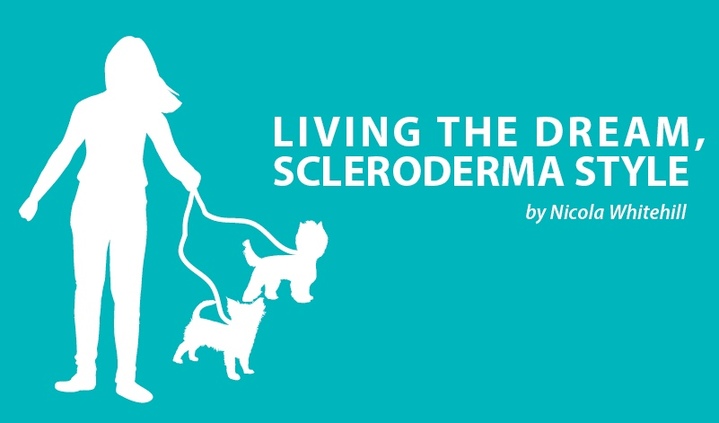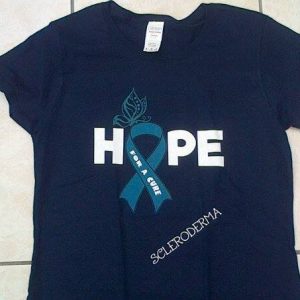Scleroderma and the Role of Medical Research
Written by |

The role of medical research is of huge importance to the scleroderma patient, and to rare disease patients in general. There is currently no cure for scleroderma, and the causative mechanisms still remain a mystery. That said, understanding the cause and cure is accelerating faster than ever before.
Investment in medical research provides immense hope to the scleroderma patient. When living with an incurable diagnosis, hope is the next best thing to discovery of cause and cure.
Hope has been my constant companion during the last 19 years, along with the inspiration and comfort I get from being a patient of one of the world’s leading scleroderma pioneer medics, Prof. Chris Denton.
I wrote about the “Scleroderma Patient Healthcare Dream Team” in this post: https://sclerodermanews.com/blog/2016/06/29/day-30-scleroderma-awareness-month-the-healthcare-dream-team/
And I wrote about the daily routine for managing my symptoms here: https://sclerodermanews.com/blog/2016/08/03/the-scleroderma-olympian/.
At the 4th Systemic Sclerosis World Congress held in February, in Lisbon, The Journal of Scleroderma and Related Disorders (JSRD) was launched. The JSRD is dedicated solely to scleroderma and its overlap disorders.
The presence of this respected medical journal on the world stage provides hope to patients by way of showing the current ongoing, actual medical research results and investment. It includes approaches being used to endeavour to shine desperately needed light on improving scleroderma patient treatments and care. I discussed this in further detail earlier in the year.
I also discussed “Why Global Collaboration is Important” here: https://sclerodermanews.com/2016/03/14/5517/.
And “The Importance of Expert Specialist Centres,” which can be hubs of medical research advancing the science of understanding across a global platform here: https://sclerodermanews.com/blog/2016/07/15/expert-specialist-scleroderma-centers/
The second issue of the JSRD (at www.sclerodermajournal.com) was recently published with the following content:
Reviews
- Systemic sclerosis trial design moving forward — Sindhu R. Johnson, Dinesh Khanna, Yannick Allanore, Marco Matucci-Cerinic, Daniel E. Furst
- Extracorporeal shock wave therapy for digital ulcers associated with systemic sclerosis — Shinichiro Saito, Tomonori Ishii, Kenta Ito, Hiroaki Shimokawa
- Emerging strategies for treatment of systemic sclerosis — Dinesh Khanna, Jorg H.W.Distler, Peter Sandner, Oliver Distler
- Systemic sclerosis-related calcinosis — Ariane L. Herrick, Andrzej Gallas
Original Research Articles
- Gender differences in systemic sclerosis: relationship to clinical features, serologic status and outcomes — Christine Peoples, Thomas A.Medsger Jr., Mary Lucas, bedda L. Rosario, Carol A. Feghali-Bostwick
- Potential beneficial role for endothelin in scleroderma vasculopathy: inhibition of endothelial apoptosis by type B endothelin-receptor signalling — Yongqing Wang, Nezam Altorok, Bashar Kahaleh
- Effect of endothelin-1 receptor antagonists on skin fibrosis in scleroderma patients from the EUSTAR database — Suzana Jordan, Jorg Distler, Britta Maurer, Ulrich A. Walker, Doerte Huscher, Yannick Allanore, Gabriela Riemekasten, Oliver Distler on behalf of EUSTAR
- A randomised controlled trial of acupressure for the treatment of Raynaud’s phenomenon: the difficulty of conducting a trial in Raynaud’s phenomenon — Heather Gladue, Veronica Berrocal, Richard Harris, Pei-Suen Tsou, Gautam Edhayan, Ray Ohara, Dinesh Khanna
- Mycophenolate mofetil following cyclophosphamide in worsening systemic sclerosis-associated interstitial lung disease — David Launay, Anne-Laure Buchdahl, Alice Berezne, Pierre-Yves Hatron, Eric Hachulla, Luc Mouthon
On Sept. 16-17, the Scleroderma Society of Canada held their annual weekend conference with over 200 delegates in attendance. Dr. Maureen Mayes, of the University of Texas McGovern School of Medicine, a co-founder of the World Scleroderma Foundation, and co-author of “The Scleroderma Book,” was the closing keynote speaker.
Mayes announced that a gene on the X chromosome has been identified as associated with scleroderma.
“The Scleroderma Book” provides further insight into this discovery: “To date there are 3 genes associated with scleroderma susceptibility that are located on the X chromosome – IRAK1, FOXP3, MECP2. IRAK1, FOXP3, are vital for T cell function and MECP2 is associated with DNA methylation . . .”
Here’s a link to the book: https://www.goodreads.com/book/show/2561913.The_Scleroderma_Book
This is most certainly a fantastic advancement in the understanding of the scleroderma process. And certainly extremely thought-provoking, as statistics show incidence of scleroderma to be higher in females than males.
Therefore, could the scleroderma condition be inherited by the mother’s X chromosome carrying the fault which activates a specific remote receptor on the Y chromosome for males, and X for females?? (I am grateful for my Bachelor of Sciences in Applied and Human Biology (Bsc Hons) qualification to help me try to glean a “noddy” insight into why my body wanted to do this to itself.)
However, I humbly bow to the super-human scleroderma expert medics we are blessed to have in the global scleroderma community, who I have every hope and confidence will discover the miracle for scleroderma eradication in our/my lifetime.
I have participated in numerous clinical trials for medical research. I see this participatory opportunity as a duty and a pleasure. A duty, as I hope to be able to help future scleroderma generations.
In addition, I am extremely grateful to all scleroderma patients who assisted in medical research which has enabled the long-term outlook of living with a scleroderma diagnosis more favorable than ever before. Especially when an early diagnosis prevented irreversible internal damage.
There are numerous scleroderma clinical trials currently happening all over the world. A few examples are:
The Medical University of South Carolina is looking for online participants to help their understanding of the “Role of Environmental Factors in the Development of Systemic Sclerosis / Scleroderma.”
The New Orleans Scleroderma Patient Care and Research Center is running a national study using telephone counselling and online questionnaires to assess the impact of various diets that might impact symptoms in scleroderma.
The Scleroderma Patient Centered Intervention Network (SPIN) was also discussed at the recent meeting in Canada, by Dr. Janet Pope. I have participated in SPIN questionnaires online for a few years to help research. I think that the ongoing SPIN research is a fantastic tool for providing understanding into the holistic approach to treating and responding to scleroderma. If you want to participate in the SPIN study, please email me: [email protected].
The Royal Free Hospital in London is currently recruiting participants to look into the clotting factors in scleroderma patients. https://sclerodermanews.com/blog/2016/06/12/day-13-scleroderma-awareness-month-factor-xiii/
If you would like to donate to fund vital medical research into scleroderma, where all money will be used for medical research, please visit my JustGiving Page for the Scleroderma Unit at The Royal Free Hospital in London, headed up by Prof. Chris Denton. Here’s the link:
https://www.justgiving.com/fundraising/sclerodermaunit-royalfree
All in all, an investment in global medical research is essential for the scleroderma patient. The time it takes for newer biologic innovative medicines to reach the market place needs to be reduced, as does access to medicines shown to have a remarkable improvement in disease progression and severity.
Time is a luxury for the scleroderma patient and all rare disease patients. Medical research is making improvements, but patients are quite literally “dying for a cure.” I am grateful that I am still around to be a scleroderma patient in the hope that investment and commitment to accelerate medical research will instigate a light bulb moment needed for a ‘scleroderma free world’ – imagine that!
In the meantime I will continue to “Live the dream, Scleroderma Style,” with hope, remaining as my best friend and companion – I even have the T-shirt.
Note: Scleroderma News is strictly a news and information website about the disease. It does not provide medical advice, diagnosis, or treatment. This content is not intended to be a substitute for professional medical advice, diagnosis, or treatment. Always seek the advice of your physician or other qualified health provider with any questions you may have regarding a medical condition. Never disregard professional medical advice or delay in seeking it because of something you have read on this website. The opinions expressed in this column are not those of Scleroderma News or its parent company, Bionews Services, and are intended to spark discussion about issues pertaining to multiple sclerosis.







